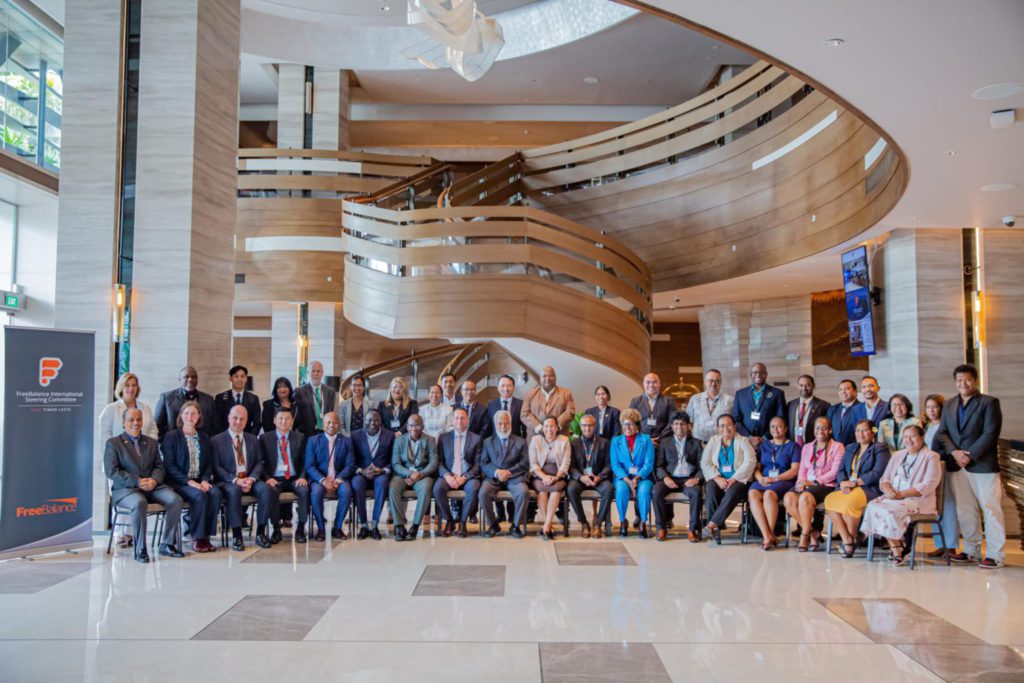Global government attendees share, solve, and scale public finance innovation
FreeBalance customers gathered together earlier this month at the FreeBalance International Steering Committee (FISC) in Timor-Leste. FISC demonstrates our customer-centric approach, as it is both a learning event and an opportunity for customers to directly influence the FreeBalance Accountability SuiteTM roadmap.

What success factors were identified at FISC?
Across the four-day event, FISC 2025 attendees identified success factors for public financial management (PFM) reform and government resource planning (GRP) implementation. Attendees shared what they would have done differently, discussing common themes and taking the opportunity to learn from each other to manage potential future challenges. Together, they identified that:
- Political will é um critical success factor to successful reform and implementations. FISC attendees pointed out that leadership will is required:
- From finance ministers, high-level public servants like permanent secretaries
- To delegate responsibilities to those who do the work, rather than upper management determining what’s best for the government
- For the transition to accrual accounting that requires significant political will & long-term thinking
- To ensure that there are strategic documents for PFM reform, which can then be adapted into more detailed action plans
- Organizacional gestão de mudanças é um critical success factor for successful GRP adoption. FISC attendees pointed out the importance of:
- User involvement in functional requirements
- User communications using different modalities (emails, workshops, newsletters, update sessions, videos, marketing materials) throughout projects
- Early demonstration of functionality to project teams and user groups through workshops
- Top-down change, advocated from leadership, often works better that bottom-up change – however, leaders often need to be educated to understand the necessity of change for national goals, citizen trust, decision-support, and reelection
- Capacitação is another critical success factor that works in concert with change management. FISC attendee lessons learned included:
- Investing more in training than in the original budget
- Focusing on users in addition to managers: many training programs focused primarily on management
- More permanent training, education, and certification programs to sustain usage of systems because of attrition and transfers
- Capacity building beyond products to PFM, project management, change management, and ICT training
- Knowledge transfer from vendors like FreeBalance
- Problem of attrition
- Need to fully document all policies and procedures to help new staff
- One country has a policy that all civil servants must stay in a position for at least a year and a half after fully trained, and fully train replacements
- Train-the-trainer programs are not optimal when the trainer does not have teaching skills or domain knowledge
- Other modalities other than training is necessary for success
- Important gestão de projetos practices included project preparation com:
- Focus on risk management by identifying and mitigating potential issues covering technology, political will, change, capacity and scope
- Use of a government project management office with public servants dedicated to projects to facilitate decision-making and approvals, otherwise meetings are missed and projects are delayed because of poor government project practices
- Full-time project teams encourage change agents (those who agree with new systems) and build capacity – that is not possible when those running projects have other duties
- Modification of the Chart of Accounts (although there were nuances because of the FreeBalance multiple year COA ranging from slight additions to current classifications to eliminate poor design to comprehensive changes)
- Important gestão de projetos practices included scope management com:
- Containing unnecessary customizations to make the new software operate like legacy systems, requiring formal change request methods, and integration with organizational change management to demonstrate how the GRP achieves desired outcomes
- Strong process re-engineering to leverage automation and control functionality within the GRP to eliminate manual processes and improve public finance efficiency
- Aligning PEFA assessment with government priorities to drive sequence of GRP module adoption and module modernization
- Fiscal resilience lessons learned from the financial crisis, pandemic, and natural disasters included:
- Need for fiscal framework and rules with required flexibility
- The use of fiscal shocks to encourage further PFM reform through political will and citizen recognition of the need for change
- Integrated data is required for decision-makers and for fiscal transparency to achieve citizen trust
- Cooperation with development partners to align with what governments see as important to pull necessary funding through sharing fiscal evidence
How did FISC attendees spend their time?
Over the course of the event, we undertook a mix of learning, discussion and knowledge exchange methods. Given that one of the key benefits of FISC is the opportunity for peer-to-peer learning, it’s perhaps no surprise that the highest percentage of time was spent in interactive workshops:
- Workshop sessions: 40%
- Roadmap sessions: 15%
- FreeBalance ‘What’s New?’ sessions: 15%
- Knowledge sessions: 25%
- Welcoming and Wrap Up sessions: 5%
What customer achievements were identified at FISC?
FISC 2025 attendees shared recent public financial management achievements from their governments. These can be broadly grouped into four categories:
- Development of frameworks and legal reforms, including:
- PFM legal frameworks
- PFM reform plans
- PFM roadmaps
- Reforma das aquisições
- GRP rollouts and progressive activation of functionality, such as:
- Support for legal reform
- Transparency and accountability functionality, including transparency portals, and elimination of manual steps
- Data-driven dashboards
- Integration with revenue, debt, and central bank
- Implementation or planned implementations of public finance assessments, including:
- Public Expenditure and Financial Accountability (PEFA) assessments
- Public Investment Management Assessment (PIMA)
- Tax Administration Diagnostics Assessment Tool (TADAT)
- Other achievements, such as:
- Improvements in PEFA assessment scores
- Securing funding from donors for transparency initiatives that also support other e-government needs.
FISC 2025 attendees return to their home countries with new learnings, which can be used to inform future PFM reform and GRP practice. Click on the topic tag “FISC” below to read more blog posts on this important customer event.
